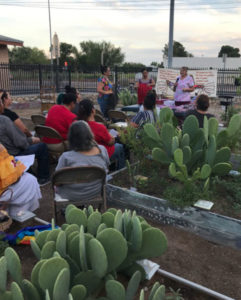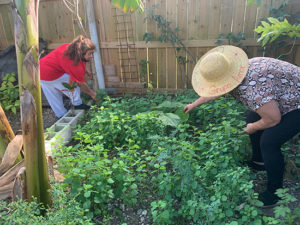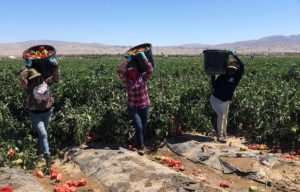
Alianza Nacional de Campesinas is proud to be a part of the One Billion Rising against gender based violence and exploitation. We recognize this year’s theme of Rising Gardens as an acknowledgment of the work that we do on a daily basis, the work of cultivating and nourishing the land so that in turn, the land can nourish us. As a community, campesinas across the U.S. face many struggles, from grueling working conditions where we are exposed to all of the weather elements as well as pesticides; lack of access to health care and government assistance; harassment and violence in the fields and in our own homes; and an inhumane immigration system. Unfortunately, the global pandemic of Covid-19 has exacerbated all of our daily struggles. It has also put a spotlight directly on the disparities and inequities of our economy. Those of us most affected by the pandemic: immigrants, Black, Indigenous and communities of color, the working class and the poor are also many of the same people who occupy the jobs that are considered “essential.” This means we cannot work from home, we cannot socially distance where we work, we have the added burden of juggling our own jobs and caring for children during school hours because of school closures, and on top of all of this, campesinas specifically, do not have access to what little government assistance has been made available to citizens of the U.S. because so many of us are undocumented.
 Despite the added chaos the pandemic has brought into our lives, there’s something else the pandemic has shown us, which is that our current economic system is not designed to support people during a crisis, whether it be a health pandemic or an environmental catastrophe. What has proven useful and helpful in these trying times, is the mutual aid and the care of human beings toward other human beings. This just goes to show us that instead of “fixing the system” to ensure our needs are addressed, we can and many of us are creating new or alternative systems all together. The current system is not “broken,” in fact it was designed specifically to benefit a small few. Mutual aid and care networks outside of the mainstream economic system have always been the survival mechanism for campesinas, and now because of the pandemic, many others who may have an added privilege like citizenship, are also starting to turn to and rely on mutual care projects, networks, and systems to survive in the face of job loss, illness, hunger, and housing loss.
Despite the added chaos the pandemic has brought into our lives, there’s something else the pandemic has shown us, which is that our current economic system is not designed to support people during a crisis, whether it be a health pandemic or an environmental catastrophe. What has proven useful and helpful in these trying times, is the mutual aid and the care of human beings toward other human beings. This just goes to show us that instead of “fixing the system” to ensure our needs are addressed, we can and many of us are creating new or alternative systems all together. The current system is not “broken,” in fact it was designed specifically to benefit a small few. Mutual aid and care networks outside of the mainstream economic system have always been the survival mechanism for campesinas, and now because of the pandemic, many others who may have an added privilege like citizenship, are also starting to turn to and rely on mutual care projects, networks, and systems to survive in the face of job loss, illness, hunger, and housing loss.
While agricultural work in the fields is some of the lowest paid work in this country, it is also some of the most essential, for the obvious reason that food is essential to life. Those of us who do this work, day in and day out, have the life skills necessary to live off the land and we understand how to work in harmony with the land as opposed to having a hierarchical and extractive relationship with the land. Many of our demands for better and safer working conditions also lead to healthier agricultural practices that are less harmful to the land and environment. The theme of Rising Gardens as this year’s One Billion Rising campaign is a direct acknowledgement of the importance of reevaluating our relationship to the land and the environment and also reevaluating what, as a society, we value. When we value life, then we prioritize and value the work related to sustaining life. When we value wealth, power, and accumulation of land and property, then we have a system in place that supports a small few while the rest of us work to sustain their lifestyle.
 Although we have the knowledge of how to work the land for human sustainability, we do not own the land that we work, and most often do not own land generally, which puts us at a disadvantage in a society where land ownership equals power, access, and security. The idea of land ownership has its roots in settler-colonialism and extractive capitalism. It was created as a tool for some people to hold power over other people. It is because of lack of access to land in our home countries, lack of access to clean drinking water and climate chaos, that so many of us are forced into migration looking for opportunities to survive. For these reasons Alianza’s work is multifaceted and intersectional; we support the efforts of campesinas to organize, and promote their leadership in the struggle for better and safer working conditions, a living wage, and overall human rights. And we are also a part of a larger international movement to shift away from an economy that exploits those who are essential to society, and toward an economy that values our essential work and understands that the labor involved in cultivating the land to nourish ourselves and our communities is care work, and that care work is essential to human survival, and therefore the central value of the new economy.
Although we have the knowledge of how to work the land for human sustainability, we do not own the land that we work, and most often do not own land generally, which puts us at a disadvantage in a society where land ownership equals power, access, and security. The idea of land ownership has its roots in settler-colonialism and extractive capitalism. It was created as a tool for some people to hold power over other people. It is because of lack of access to land in our home countries, lack of access to clean drinking water and climate chaos, that so many of us are forced into migration looking for opportunities to survive. For these reasons Alianza’s work is multifaceted and intersectional; we support the efforts of campesinas to organize, and promote their leadership in the struggle for better and safer working conditions, a living wage, and overall human rights. And we are also a part of a larger international movement to shift away from an economy that exploits those who are essential to society, and toward an economy that values our essential work and understands that the labor involved in cultivating the land to nourish ourselves and our communities is care work, and that care work is essential to human survival, and therefore the central value of the new economy.
 Over the last couple of years Alianza member organizations across the U.S. have started initiatives to gain access to unused lands in order to start community gardens in their towns and neighborhoods. As they continue to lobby for access to public lands, individual members who have backyard gardens share their crops, fruits and vegetables, herbs and plants amongst each other and also organize workshops for one another about various plants and herbs and their medicinal properties. In addition to sharing what they grow, they have also organized with food donation centers to bring food to campesinas during the pandemic. While campesinas harvest produce all day, many are food insecure. These projects organized by campesinas and for campesinas are examples of the mutual aid projects that sustain us and have become our life line in these precarious times. Community gardens and shared backyard gardens have provided healing spaces to Alianza members and their fellow campesinas. They also provide space free from employers, free from harvest quotas, free from abuse, harassment and exploitation for our members to reconnect and reflect on what it means to be in right relationship with mother earth. These projects are examples of alternative economies, in other words, they are systems designed to meet community needs; needs which the State should take care of, but until then, we continue to lobby the State while also providing for one another.
Over the last couple of years Alianza member organizations across the U.S. have started initiatives to gain access to unused lands in order to start community gardens in their towns and neighborhoods. As they continue to lobby for access to public lands, individual members who have backyard gardens share their crops, fruits and vegetables, herbs and plants amongst each other and also organize workshops for one another about various plants and herbs and their medicinal properties. In addition to sharing what they grow, they have also organized with food donation centers to bring food to campesinas during the pandemic. While campesinas harvest produce all day, many are food insecure. These projects organized by campesinas and for campesinas are examples of the mutual aid projects that sustain us and have become our life line in these precarious times. Community gardens and shared backyard gardens have provided healing spaces to Alianza members and their fellow campesinas. They also provide space free from employers, free from harvest quotas, free from abuse, harassment and exploitation for our members to reconnect and reflect on what it means to be in right relationship with mother earth. These projects are examples of alternative economies, in other words, they are systems designed to meet community needs; needs which the State should take care of, but until then, we continue to lobby the State while also providing for one another.
At this pivotal moment in history when we are faced with increasing climate disasters, and find ourselves in the midst of a global pandemic with more looming on the horizon, we continue our daily efforts and campaigns for better working and living conditions. Alianza Nacional de Campesinas and our members will continue to organize to end pesticide usage in the fields, we will continue to demand our rights as immigrants and essential workers, and for an end to gender based violence in the fields, in our homes and in our communities. We also recognize that our daily struggles are a part of a larger movement toward building another, more just, equitable world centered around life and with the core values being care, mutual support and protection of one another and mother earth. This requires a dismantling of our current systems of patriarchy, racism, imperialism and the extraction and exploitation of land and labor. Our daily struggles are a key component of the movement to build another world. Not only is another world possible, it is essential for the survival of humanity.
Campesinas join the One Billion (Gardens Rising) for a better, more just and equitable world!